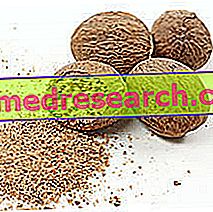
Scientific name
Myristica fragrans
Family
Myristicaceae
Origin
Southeast Asia, Moluccas island
Synonyms
nutmeg
Used Parts
Drug consisting of the fruit, the walnut
Chemical constituents
- Starch;
- Lipids;
- Triterpene saponins;
- Sterols (including beta-sitosterol and campesterol);
- Essential oil (monoterpenes, diterpenes, eugenol, myristicin, safrole).
Nutmeg in Herbal Medicine: Properties of Nutmeg
Nutmeg is a spice used very frequently in cooking as a flavoring, but care must be taken not to overdo the doses, due to the side effects that can occur.
The use in therapy, instead, is practically absent.
Biological activity
The use of nutmeg has not obtained official approval for any type of therapeutic indication, due to the considerable side effects that can cause when taken at high doses. Despite this, this plant appears to have interesting properties.
In fact, a recent study (2016) conducted in vivo has shown that nutmeg oil is able to exert an anti-inflammatory and analgesic action by inhibiting the expression of cyclooxygenase type II, that is of the deputy enzyme to the synthesis of prostaglandins responsible for the onset of inflammation and pain.
To the nutmeg are also attributed digestive, astringent and carminative properties; for this reason, it can be found in preparations used to promote regular gastroenteric function and / or with indications for the treatment of digestive disorders, diarrhea, aerophagia and flatulence.
Furthermore, antiseptic, sedative and stimulant properties are also attributed to nutmeg.
Nutmeg in folk medicine and homeopathy
In folk medicine, nutmeg is used as an internal remedy in the treatment of dysentery, diarrhea, vomiting, flatulence, cramps and inflammation of the gastric mucosa.
Externally, however, traditional medicine uses the nutmeg essential oil for the treatment of neuralgia, sciatica and rheumatism; as well as using it as a remedy to counteract upper airway disorders.
Chinese medicine, on the other hand, uses nutmeg to treat digestive disorders, nausea and diarrhea; while Indian medicine uses it in case of headaches, insomnia and vision problems, even using it as a remedy for malaria, cholera and impotence.
Nutmeg is also used in homeopathic medicine, where it can easily be found in the form of granules, capsules and oral drops.
In this context, nutmeg is used for the treatment of various disorders, such as: intestinal swelling, digestive disorders associated with flatulence, excessive sleepiness, mood swings, difficulty concentrating, visual hallucinations, excessive dry eye, dry skin and mucous membranes and irregularities in the menstrual cycle.
The amount of homeopathic remedy to be taken can vary from individual to individual, also depending on the type of disorder that needs to be treated and the type of homeopathic preparation and dilution that you want to use.
Side effects
If used correctly, nutmeg should not cause undesirable effects. However, in sensitive individuals, contact dermatitis may occur.
If taken at too high doses - so in case of overdose - even serious side effects can occur, including hallucinations and seizures.
If taken in excessive doses during pregnancy it can be abortive, but not only: the safrole contained in the essential oil has mutagenic activity and has been shown to be carcinogenic.
Contraindications
Avoid using nutmeg in case of hypersensitivity to one or more components and in patients with epilepsy. Furthermore, the use of nutmeg is not recommended even during pregnancy and breastfeeding.
Pharmacological Interactions
Drug interactions with psychotropic drugs and MAOIs may occur, since the concomitant intake of nutmeg may enhance the effects of the aforementioned medicines.



